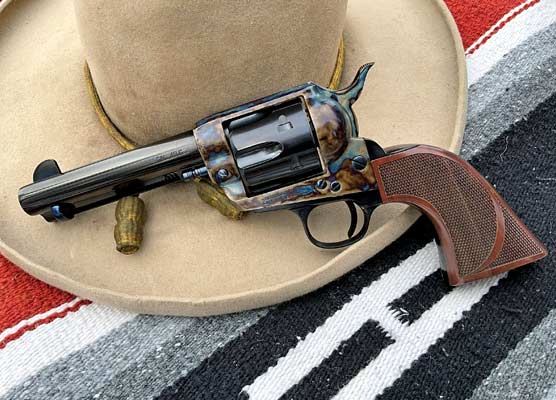The Maine Thing
Federal Judge Calls It Right On 2A
Every now and then while reporting on this or that state or federal gun rights case, I run across a piece of judicial logic that simply stands out in its clarity and common sense. Such is the case of a 17-page ruling handed down last month by Chief U.S. District Judge Lance Edward Walker in Maine.
The case is known as Beckwith et.al. v. Frey, challenging a 72-hour waiting period which became law last August in Maine. The case went before Judge Walker, a Donald Trump appointee, last November. Judge Walker granted a preliminary injunction in February. The rub is that the defendant, Maine Attorney General Aaron Frey quickly appealed to the First U.S. District Court of Appeals in Boston.
Waiting periods, according to the plaintiffs, violate their Second Amendment rights, and the judge concurred. Read some of Judge Walker’s wisdom about the right to keep and bear arms:
“Beyond the lack of a suitable regulatory analogue in our Nation’s history and tradition, waiting period laws like the one contained in the Act do not employ narrow, objective, or definite standards to justify disarming individuals,” Walker writes. “The waiting period is not narrow since it applies to very near everyone seeking to purchase a firearm and their entire right to keep and bear any firearm at all through purchase is temporarily banned. Nor is the waiting period objective since it does not permit the evaluation of facts as they pertain to the individual seeking to carry away the firearm. Sellers are not tasked with inquiring whether buyers are intent on harming themselves or others and all buyers are effectively deemed suspect. Attorney General Frey argues that the waiting period requirement is the most objective standard that could be imposed because there is no individualized inquiry. But indiscriminate application of a requirement is different from an objective application of a condition. With indiscriminate application objectivity is entirely beside the point. For essentially the same reason, the Act does not employ a definite standard. In fact, the Act is filled with and motivated by doubt—doubt about what someone could conceivably do, but far more likely will not do, upon carrying a firearm away from a seller. That kind of doubt is timeless, and certainly it was familiar to our forebears in the Colonial and Reconstruction Eras. Yet we still have a Second Amendment that reads: “[T]he right of the people to keep and bear Arms, shall not be infringed.”
Anti-Gunners Critical
As one might expect, the gun prohibition lobby and pro-gun control groups did not like Judge Walker’s decision. Several anti-gun groups had submitted amicus briefs to the court in support of the waiting period law.
The list included the Brady Center to Prevent Gun Violence, Giffords Law Center to Prevent Gun Violence, Maine Association of Psychiatric Physicians, Maine Coalition to end Domestic Violence and the Maine Gun Safety Coalition.
So, why do these folks support waiting periods? The simple reason is they’ve become convinced that anyone who buys a gun is up to no good and needs some time to cool off. They mask this nonsense with arguments about “needing time to conduct a background check.” But it’s a feint. Back in 1994 — 30-plus years ago for those without a calendar — when the Brady Law was passed with the creation of the National Instant Check System in lieu of a proposal for a national waiting period, the NICS system was supposed to make it possible to identify people who couldn’t have guns. Sure, it wasn’t perfect — there were some failures, as there are in any endeavor — but the principle was sound. Do checks on people with a minimal amount of inconvenience.
But anti-gunners never let go of the waiting period. They obviously don’t trust average American citizens and want to throw as many inconvenient speed bumps as possible in their way to exercising Second Amendment rights. Maine’s waiting period is three days. In California and my home state of Washington, it’s 10 days.
The dirty little secret about which these gun hoplophobes will never admit is that criminals ignore background checks by getting their guns through illicit means. Crazy people planning something horrific, and who have no prior disqualifications, will pass background checks. Case in point: Elliot Rodger, the perpetrator of the Isla Vista, California murder spree. He killed three people with a knife and three more with one of three handguns he separately purchased, in California enduring the waiting period and background checks. He used only California-compliant 10-round magazines.
Judge Walker’s opinion is something at which to marvel. Here’s more common sense from this plain language jurist:
“If a citizen cannot take possession of a firearm,” Judge Walker writes, “then his or her right to possess a firearm or to carry it away is indeed curtailed, even if, as Frey claims, the curtailment is modest. However, the threshold inquiry is whether the Second Amendment covers the conduct curtailed by the Act, not a qualitative assessment of how modest the imposition on the right happens to be. Citizens wishing to purchase a firearm are dispossessed of one for 72 hours exclusively by operation of the Act’s requirement that everyone be subjected to a “cooling off” period, even those who have passed an instant background check at the FFL dealer’s counter. That is indiscriminate dispossession, plain and simple.”
Put in simpler terms, a right delayed is a right denied.
Burglars Out-gunned
A Kentucky youngster fatally shot a pair of middle-aged burglars in February as they were reportedly invading the child’s home in search of guns to steal, according to KWTX and WYKT/Gray News.
Reports identified the bad luck boys as 51-year-old Jeffrey Allen, who died at the scene, and his 44-year-old accomplice as Roger Smith, who died at the hospital.
The experience for the young shooter was undoubtedly traumatizing, but the report underscores why waiting periods and other gun control laws simply miss the target. Criminals do not bother with the legal channels when they buy guns. The two guys in this story certainly weren’t interested in paperwork or waiting 72 hours to pick up a gun. They won’t be doing any further illicit transactions.
Gun Rights Conference Set
The 40th annual Gun Rights Policy Conference (GRPC) is scheduled Sept. 26-28 in Salt Lake City, at the Salt Lake Marriott Downtown at City Creek.
Co-hosted by the Second Amendment Foundation and Citizens Committee for the Right to Keep and Bear Arms, this conference will bring together gun rights leaders and grassroots activists from all over the country. Expect several hundred people to attend. It is an opportunity for people to network, hear crucial reports about gun rights and gun challenges.
Registration is open here.
The agenda will be loaded with panel discussions, individual reports and lots of important information. If you’ve never attended a GRPC, this year’s event should be the one for you.







